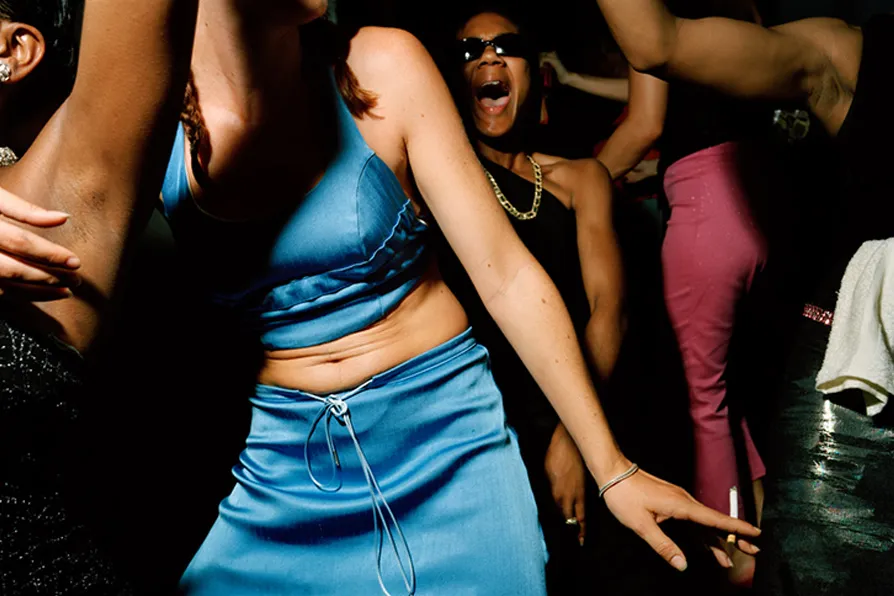New releases from Bill Callahan, The Delines, and Beck
ANGUS REID calls for artists and curators to play their part with political and historical responsibility

 Ewen Spencer; Twice as Nice, The End, London, 1999 / Pic: Courtesy the artist
Ewen Spencer; Twice as Nice, The End, London, 1999 / Pic: Courtesy the artist
SOMETIMES the questions raised by exhibitions are more important than anything they might offer as answers. Such is After the End of History: British Working Class Photography 1989-2024, currently showing at Stills Gallery in Edinburgh, and soon to make it to the Hayward Gallery in London.
It aims to trace the working-class culture of the past 35 years in Britain, in photography, since what it brazenly describes is the “symbolic end of communism” in 1989. This statement not only betrays an anti-working-class agenda, but also wilful ignorance of working-class history.
In the context of British history, the fall of the Berlin wall is hardly more important than the Battle of Orgreave, five years earlier, in terms of the trauma that lead to the fragmentation of organised labour, or indeed the advent of Thatcher and right-wing authoritarianism five years before that. But these dates are wilfully ignored.
It may have an excellent photographer and “cultural activist” acting as curator, Jonny Pitts, whose obvious relish for all kinds of evidence of working-class vitality and artfulness is to the fore, along with a welcome sense of responsibility towards little-known and unrepresented artists. So, how to account for the air of despair, isolation and consumerist hedonism that pervades the show?
Surely, the answer is that it has not been built on solid foundations of class consciousness, of clear-minded political or historical understanding and so, rather than presenting working-class power and militancy, it dissolves itself into pools of pessimism.
Here, you don’t find the strikes and the pickets, the defiance and the dignity of the working class. Here there is no whisper of a challenge to the state. This is a Thatcherite perspective that makes no effort to portray people except as degraded into wasters, into consumerists without a soul, into literal cannon fodder.
This is an enormous problem.
When the role of curating art is politically timid and historically ignorant, it results in this kind of insult to the whole class. While the Hayward Gallery may be content with this aimless and patronising scrapbook, it doesn’t do justice to the the people in the pictures, or to the photographers it gathers together, or to the class itself. You can’t imagine actual working people coming to this show. Who would pay money to have such stuff forced down their throat?
This show is designed for that small minority of the ruling class who wish to be reassured that the working class stays in its place. And the working class itself, confronted with this image of itself, with this so-called culture, is only encouraged to neglect its own depressing history and wallow in despair.
What is needed is for the class to curate its own archive, rather than to be patronised by the pseudo authority of the latest hireling.
A word on what this show is doing. Here, the “working-class aesthetic” is being mined for titivation (in the drunken Ibiza raves recorded by Ewen Spenser), for hopelessness (in the documentary black-and-white images of TA Motram), for irredeemable poverty (in the desolate and empty images of council seats recorded by Natasha Edgington), for extremes of identity politics (Hannah Starkey), and for that unmistakeable air of ennui, drugs and drunkenness throughout (by Chris Shaw, Eddie Otchere, Anna Magnowska, Tosh Cole et al).
The individual photographs are almost always striking, but the cumulative effect is deadening, depressing and apolitical. This is no true mirror held up to represent the class, but a hammer in the wrong hands, being used to smash it.
Here and there, however, and presented without context, are some telling moments that might incite you to curiosity, such as the stand-out images of the show: Sandra George’s studies of black women activists in late 1980s Edinburgh. But there is no effort made to describe what is going on, and what these activist women achieved. Rather, in a gesture that seems to apologise for their militancy, these images are all printed at small scale and bundled together like an old album from another era.
Better curation would have vastly enlarged one of these images to catch the eye, and presented a context for the activism depicted. There’s a lesson to be learned here.
We need to gather and curate our own history and imagery and archive. We need to do justice to our militancy. We need proper curation that draws on the wealth of economic and sociological understanding that you can find among social workers, activists and labour historians. If there is a task for cultural officers throughout the trade unions, it is this. We need to be rid of the patronising attitude of this Thatcherite view.
In an era when the state produces a stooge like Keir Starmer, who claims to be working class, then you can see the need for a robust culture than can challenge such vacuous nonsense with strength and certainty, and treat it with the scorn it deserves.
Runs at Stills Gallery, Edinburgh until June 28, stills.org; and from October 3 to December 13 at ffotogallery, Cardiff.

Peter Mitchell's photography reveals a poetic relationship with Leeds












